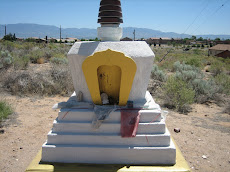Chrissie Hynde just sounds like home to me, and not because she looks exactly like my Aunt Patti with black eyeliner and a Telecaster. The Pretenders were among the first rotations on MTV in 1981 and I became an instant fan at age 10. I painted the living room of my first house with their Greatest Hits spinning ad infinitum on my crappy CD boombox. I heard “Kid” and “Chain Gang” more that weekend than I did in all the eighties combined!
Their newest record, Break Up the Concrete, dropped last fall. It took a few months for me to get around to really taking a listen. Lo and behold, “Boots of Chinese Plastic.” It’s rockabilly, it’s punk, it’s Buddhist, it’s...the Pretenders!
Finally, a song that doesn’t suck (I have yet to hear it on Indianapolis radio, so that’s proof right there) and a singer who really plays her own instrument (suck it, American Idol tools)! It’s called musicianship. Art. Rock & Roll.
Natch, you can find scads of great reviews elsewhere for Chrissie and the boys. I won’t bore you with my equally gushing opinions. What I hope to help with is the Buddhist aspects of the lyrics of this timely song.
Boots opens with Chrissie reciting, “Nam-myoho-renge-kyo, Buddha please/Can you help a little peasant girl that’s begging on her knees?”
Nam-Myoho-renge-kyo, is the title of the Lotus Sutra, one of the most profound teachings of Buddhism, which reveals the truth of existence. While the Lotus Sutra is intrinsic to all Buddhist teachings, this is the Japanese expression. When the sutra came to Japan from China (originally comprised of various Indian dialects) about 1,800 years ago, it was simply “Myoho-renge-kyo.”
Nam was added to the other syllables to add respect or dedication, much like Christians might suffix “Amen” to the end of a prayer. The whole phrase, therefore, means “Devotion to the mystic/universal law of the Lotus Sutra.”
Tibetan Buddhists recite a similar mantra in its original Sanskrit form, “OM Mani Padme Hum or Om Mani Peme Hung,” which means, “Behold the jewel in the Lotus (sutra),” which is essentially like saying, “I have seen the light! I get it! Cause and Effect! Accepting whatever is as a transient phenomenon!”
“I’ve spent a million lifetimes loving the same man,” Chrissie rocks. “Word,” I think, as I pick up my husband’s socks for the ten thousandth time, remembering to practice patience when I can’t be sitting in the meditation hall chanting OM, OM, OM! I thank the Pretenders for the gentle reminder.
If you'd like to get some audio-video to go along with this post, click over to kitty: magazine to see it in its first incarnation. Peace!

Thanks I am going to check it out and also thanks for the translation. I love learning, thanks for sharing!
ReplyDelete